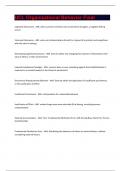Exam (elaborations)
UCL Organizational Behavior Final
- Course
- Institution
Cognitive Dissonance - ANS when a person entertains two inconsistent thoughts, a negative feeling occurs Vicarious Dissonance - ANS when an individual places himself in a hypocrite's position and empathizes with the other's feelings Eliminating Cognitive Dissonance - ANS done by either one chan...
[Show more]



